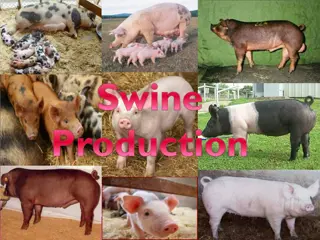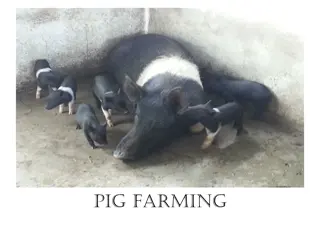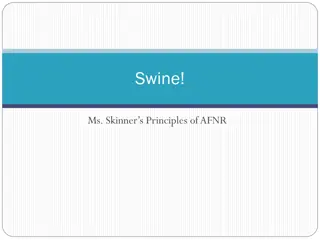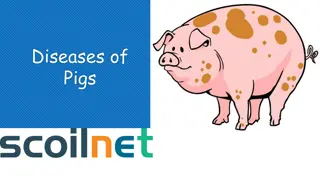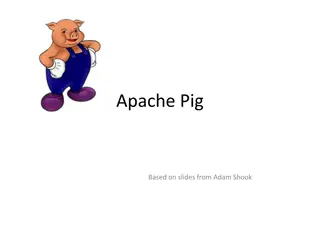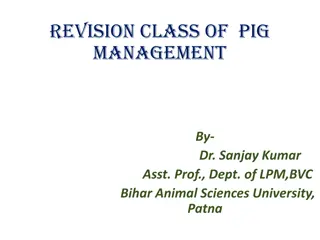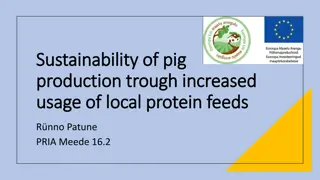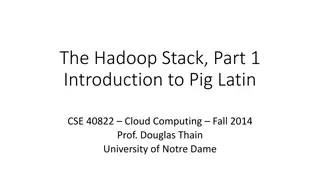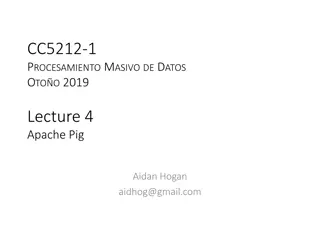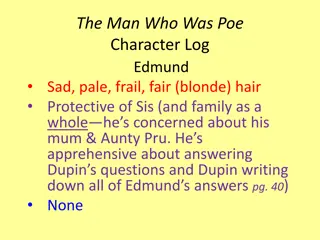Understanding Aunty Jean in "Martyn Pig
The portrayal of Aunty Jean in the novel "Martyn Pig" reflects a character despised by the protagonist and other characters. Descriptive language and character interactions paint her as a terrible, unpleasant woman. Through negative adjectives and character perspectives, the novel presents Aunty Jean as a significant figure evoking strong emotions and reactions from the readers.
Download Presentation

Please find below an Image/Link to download the presentation.
The content on the website is provided AS IS for your information and personal use only. It may not be sold, licensed, or shared on other websites without obtaining consent from the author. Download presentation by click this link. If you encounter any issues during the download, it is possible that the publisher has removed the file from their server.
E N D
Presentation Transcript
THE QUESTION How do you respond to Aunty Jean in the novel Martyn Pig? Write about: what you think about Aunty Jean from what she says and does what other characters say about her the methods the writer uses to present Aunty Jean.
Aunty Jean A terrible woman. Think of the worst person you know , then double it, and you ll be halfway to Aunty Jean. I can hardly bear to describe her, to tell you the truth.
Time for some detective work of our own
1. When do we see Aunty Jean?
2. How do we view Aunty Jean?
Positive Negative
How we feel How others feel How she is presented Wednesday Page Friday Page Epilogue Page .
THE PLAN 1. Start with Wednesday. How is Aunty Jean presented in Wednesday? How do we feel about her? 2.We first meet Aunty Jean on Friday. How is Aunty Jean presented in Friday? How do we feel about her? 3. Aunty Jean comes to get Martyn from the station what does that us about her? How do we feel about her now? 4. Look at the epilogue. How is she presented here? How do we feel about her? How does Martyn feel about her? REMEMBER: WORTH 30 MARKS ANSWER the question Use PEA Refer back to the question Offer your own ideas/interpretations
Brooks use of language informs us from the onset that Martyn dislikes Aunty Jean. Aunty Jean is first presented to us as That Bloody woman the expletive bloody tells us straight away that William Pig believes she is a nuisance and an inconvenience in his life. His views of Aunty Jean are passed on to Martyn as he shares the same belief as his father mirroring his father s ideas with the repetition of That Bloody Woman was Aunty Jean . We do not meet Aunty Jean until later into the novel however she is described to us at the onset in a negative way.
Martyn uses a consecutive list of negative adjectives to describe Aunty Jean to us bloody , terrible , angular , cold , hard , ugly , furious . All of these adjectives tell us that she is not a nice woman and actually that she is the antithesis of the person we associate with the name aunty . Aunty usually suggests kind and caring however Martyn s experience of his aunty is that she is cold and hard . The use of the adjectives angular , cold and hard imply that she is a woman who lacks warmth and understanding. They also suggest that she is inflexible and will not tolerate fools such as William Pig. Martyn focuses on her physical description by mocking her hair with crispy blue hair which suggests that she is a figure of fun for him and his Dad. He also focuses on her mouth the metaphor Her mouth is thin and pillar-box red implies that she has too much to say and this is why both William and Martyn dislike her; maybe she has too much to say about their lifestyle.
The use of red could also imply that Aunty Jean poses some sort of danger to Martyn. The fact that Aunty Jean is so vile that she makes Martyn shudder suggests that her presence alone is enough to cause a physical reaction for Martyn. The idea that Martyn used to have nightmares about her further reinforces that she is something to be feared. The final simile She moves like a huntress, quick and quiet, homing in on her prey further implies that she is relentless in her pursuit of both Martyn and William. It is interesting to note that Martyn considers himself to be her prey yet as reader s we do not see her as a threat to Martyn at all. In fact Brooks almost paints a caricature of Aunty Jean not dissimilar to the evil stepmother in a Disney fairy tale.
It is important to note that we only ever see the character of Aunty Jean through the eyes of both Martyn and William. As a result Aunty Jean is shaped by their opinions, however Brooks does hint at the idea that Aunty Jean may in fact be a positive force in Martyn s life. When she arrives for her annual visit we see the contrast between Martyn s description and Brooks presentation of her. Aunty Jean s arrival is signalled when Martyn describes her as stiff, upright, scowling on the step as if she d been waiting there for a thousand years the use of this description further reinforces her presence as a Disneyesque character of mythical proportions this is further supported when Martyn describes her as a blue-haired, bow-legged dragon-lady . The use of similes to compare Aunty Jean to an animal is apparent throughout this section as Martyn refers to her as snorting complete with flared nostrils and a curled upper lip whom he follows like some sort of weird offspring following its mother . This may be Brooks way of hinting at Aunty Jean s motherly nature as Martyn despite his explicit feelings towards her feels inclined to follow. The personification of the doorbell sounded terrified suggests that Aunty Jean s presence permeates throughout the house. The use of the pathetic fallacy indicates that Aunty Jean could be a positive influence; this is the first time that the sun has shone since the start of the novel.
It is imperative to note that this is the only time the sun shines until the epilogue when Martyn is permanently resident at Aunty Jean s house. It was a beautiful day. Cloudless blue skies . Ultimately we see Aunty Jean through the eyes of both William and Martyn and our view of her is tainted by their experiences. Brooks on the other hand presents us with Aunty Jean in a much more positive light. In fact Aunty Jean is the only one who truly cares for Martyn. When he is at the police station or in trouble and the rest of the world has abandoned him it is that bloody woman who rescues him.




